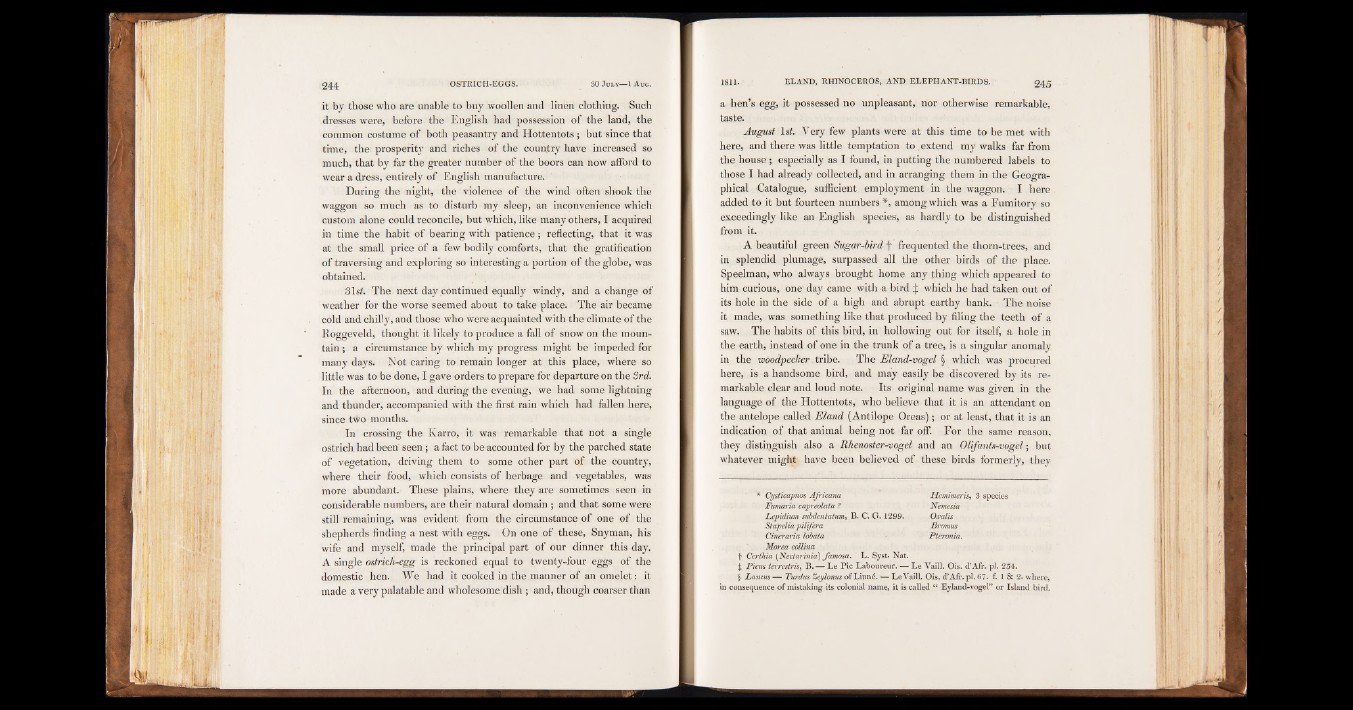
it by those who are unable to buy woollen and linen clothing. Such
dresses were, before the English had possession of the land, the
common costume of both peasantry and Hottentots; but since that
time, the prosperity and riches of the country have increased so
much, that by far the greater number of the boors can now afford to
wear a dress, entirely of English manufacture.
During the night, the violence of the wind often shook the
waggon so much as to disturb my sleep, an inconvenience which
custom alone could reconcile, but which, like many others, I acquired
in time the habit of bearing with patience; reflecting, that it was
at the small price of a few bodily comforts, that the gratification
of traversing and exploring so interesting a portion of the globe, was
obtained;
31 st. The next day continued equally windy, and a change of
weather for the worse seemed about to take place. The air became
cold and chilly, and those who were acquainted with the climate of the
Koggeveld, thought it likely to produce a fall of snow on the mountain
; a circumstance by which my progress might be impeded for
many days. Not caring to remain longer at this place, where so
little was to be done, I gave orders to prepare for departure on the 3rd.
In the afternoon, and during the evening, we had some lightning
and thunder, accompanied with the first rain which had fallen here,
since two months.
In crossing the Karro, it was remarkable that not a single
ostrich had been' seen; a fact to be accounted for by the parched state
of vegetation, driving them to some other part of the country,
where their food, which consists of herbage and vegetables, was
more abundant. These plains, where they are sometimes seen in
considerable numbers, are their natural domain ; and that some were
still remaining, was evident from the circumstance of one of the
shepherds finding a nest with eggs. On one of these, Snyman, his
wife and myself, made the principal part of our dinner this day,
A single ostrich-egg is reckoned equal to twenty-four eggs of the
domestic hen. We had it cooked in the manner of an omelet: it
made a very palatable and wholesome dish ; and, though coarser than
a hen’s egg, it possessed no unpleasant, nor otherwise remarkable,
taste.
August 1st, Very few plants were at this time to be met with
here, and there was little temptation to.extend my walks far from
the house ; especially as I found, in putting the numbered labels to
those I had already collected, and in arranging them in the Geographical
Catalogue, sufficient employment in the waggon. I here
added to it but fourteen numbers *, among which was a Fumitory so
exceedingly like an English species, as hardly to be distinguished
from it.
A beautiful green Sugar-bird f frequented the thorn-trees, and
in splendid plumage, surpassed all the other birds of the place.
Speelman, who always brought home any thing which appeared to
him curious, one’ day came with a bird f which he had taken out of
its hole in the side of a high and abrupt earthy bank. The noise
it made, was something like that produced by filing the teeth of a
saw. The habits of this bird, in hollowing out for itself, a hole in
the earth, instead of one in the trunk of a tree, is a singular anomaly
in the woodpecker tribe. The Eland-vogel § which was procured
here, is a handsome bird, and may easily be discovered by its remarkable
clear and loud note. Its original name was given in the
language of the Hottentots, who believe that it is an attendant on
the antelope called Eland (Antilope Oreas); or at least, that it is an
indication of that animal being not far off. For the same reason,
they distinguish also a Rhenoster-vogel and an Olifants-vogel; but
whatever might have been believed of these birds formerly, they
* Cysticapnos Africano. Hemimeris, 3 species
Fumaria capreolata ? Nemesia
Lepidium subdentatum, B. C. G . 1299. Oxalis
Stapelia pilifera Bromus
Cineraria lobata • Pteronia.
Morea collina
f Certhia (Nectarinia) famosa. L. Syst. Nat.
J Picus terrestris, B. — Le Pic Laboureur. — Le Vaili. Ois. d’Afr. pi. 254.
§ Lanins — Turdus Zcylonus of Linné. — Le Vaili. Ois. d’Afr. pi. 67. f. 1 & 2. where,
in consequence of mistaking its colonial name, it is called “ Eyland-vogel” or Island bird.